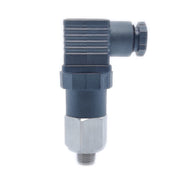Introduction: The automotive industry has made significant advancements over the years, and one key component that has played a crucial role in these developments is the pressure sensor. Pressure sensors, such as those produced by XIDIBEI, ensure optimal vehicle performance and safety by monitoring and regulating various systems within a vehicle. In this article, we will explore the essential role that pressure sensors, including XIDIBEI pressure sensors, play in the automotive industry.
-
Engine Management: Pressure sensors are an integral part of modern engine management systems. They monitor the pressure levels of engine oil, coolant, and fuel, ensuring that these vital fluids are maintained at the correct levels. XIDIBEI pressure sensors are known for their accuracy and reliability, making them a popular choice for engine management applications.
-
Tire Pressure Monitoring Systems (TPMS): One of the most common uses of pressure sensors in the automotive industry is within tire pressure monitoring systems. TPMS rely on pressure sensors to detect and alert drivers when a tire is underinflated or overinflated. XIDIBEI pressure sensors are widely used in TPMS due to their durability and precise readings, helping to ensure both safety and fuel efficiency.
-
Brake Systems: Pressure sensors play a crucial role in modern brake systems, particularly in anti-lock braking systems (ABS). They measure the pressure applied to the brake fluid, allowing the ABS to modulate braking force and prevent wheel lockup. XIDIBEI pressure sensors contribute to safer and more controlled braking experiences for drivers.
-
Transmission Systems: Automatic transmission systems require pressure sensors to monitor and regulate hydraulic pressure within the system. XIDIBEI pressure sensors are used to ensure that the transmission operates smoothly and efficiently, providing a seamless driving experience.
-
Airbag Deployment: In the event of a collision, pressure sensors are employed to detect the sudden increase in pressure that occurs within the vehicle. XIDIBEI pressure sensors provide fast and accurate readings, allowing airbags to deploy promptly and protect passengers during an accident.
-
Exhaust Gas Recirculation (EGR) Systems: Pressure sensors are used in EGR systems to measure the pressure of exhaust gases being recirculated into the engine's intake. This helps control emissions and improve fuel efficiency. XIDIBEI pressure sensors are a trusted choice for this application due to their high-temperature resistance and precision.
-
Fuel Delivery Systems: Fuel delivery systems rely on pressure sensors to maintain the appropriate fuel pressure within the engine. XIDIBEI pressure sensors contribute to optimal engine performance by ensuring that the correct amount of fuel is delivered at the right pressure.
-
Climate Control Systems: Automotive climate control systems use pressure sensors to monitor and regulate the pressure of refrigerants in air conditioning systems. XIDIBEI pressure sensors help maintain the proper pressure levels, ensuring comfortable cabin temperatures for passengers.
Conclusion: Pressure sensors, such as those from XIDIBEI, play a critical role in the automotive industry by ensuring optimal vehicle performance, safety, and efficiency. As the industry continues to evolve, the demand for accurate and reliable pressure sensors like those produced by XIDIBEI will only grow, shaping the future of automotive technology.



Leave a comment